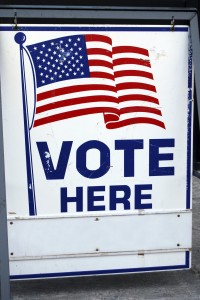BY JOEL TRAMBLEY
Tuesday evening, 100,000 or so Iowa voters will bundle up, brave the cold and head out to one of 800 political gathering places. At 7 p.m. (CST), they will begin the process of picking our next president. Below is a primer on how the process works; what could happen; and what that could mean to the LGBT community.
So, what’s a caucus, anyway? Political parties in most states choose their nominees in primary elections, the procedures of which largely mirror a November general election. In California, voters can go to the polling place on the day of the election, or they can mail in ballots before Election Day.
 However, a caucus requires voters to show up at an appointed time and place – there are no permanent absentee voters in a caucus. After choosing leaders and carrying out other preliminary activities, voters are given a chance to say who they support and why, in an attempt to sway other voters. After the speeches, Republican caucus-goers – even those who registered the day of the caucus – cast their ballots; tally the votes and send in the results. Democratic caucuses have stranger rules that result in more wheeling and dealing, but only when there is more than one name on the ballot.
However, a caucus requires voters to show up at an appointed time and place – there are no permanent absentee voters in a caucus. After choosing leaders and carrying out other preliminary activities, voters are given a chance to say who they support and why, in an attempt to sway other voters. After the speeches, Republican caucus-goers – even those who registered the day of the caucus – cast their ballots; tally the votes and send in the results. Democratic caucuses have stranger rules that result in more wheeling and dealing, but only when there is more than one name on the ballot.
Where do things stand? Over the past week, most polls have shown either former governor, Mitt Romney or Rep. Ron Paul in the lead with support in the low 20 percent range. They also agree on a late surge into the teens (up from the low single digits, just days ago) for former U.S. senator, Rick Santorum, while some show a similar increase for Gov. Rick Perry. Since his peak last week, former Speaker Newt Gingrich has been dropping toward the single digits, where Rep. Michelle Bachman has also been languishing for some weeks now. Historically, the most accurate numbers have come from the final poll put out by the Des Moines Register, which shows: Romney 24 percent; Paul 22 percent; Santorum 15 percent; Gingrich 12 percent; Perry 11 percent; Bachmann 7 percent.
Three groups seem to be in favor of a Mitt Romney victory; his campaign, the Republican establishment and people who don’t like politics and want the race to end. The victor in Iowa typically gets a bounce in the New Hampshire primary, where Romney is already ahead by a comfortable margin. He is also likely to win in heavily Mormon Nevada. Winning three of the four early voting states (conservative South Carolina still presents a problem) would make Romney a prohibitive favorite going into delegate rich Florida, where he might well seal the nomination early to the relief of an establishment that prefers to focus on defeating President Obama. LGBT take: In his 1994 Massachusetts Senate race, Romney tried to be more pro-LGBT than liberal lion Sen. Ted Kennedy. He now toes the anti-LGBT line, but among these candidates, ever supporting LGBT rights is saying something. And he’s been known to change his views.
A Ron Paul victory is widely regarded as the second best outcome for Romney and the establishment, because it doesn’t change much. Paul’s views make him uniquely acceptable to his army and equally unacceptable to most other Republicans. Even the bounce from a narrow Iowa victory is unlikely to break his 30 percent ceiling in New Hampshire and other states. As in 2008, Paul will have the money and support to slog through the entire primary calendar gathering delegates, but not enough to threaten Romney in a two-way race. (This all assumes that Romney takes at least second or third in Iowa. If he doesn’t, a victory by Paul, or anyone else, becomes more interesting.) LGBT take: Some thought Paul’s libertarian “live and let live” ethos would be good for LGBT issues, but recent stances and prior writings suggest he’s behind President Obama in his evolution.
Paul and Romney have been polling in the 20s for some time, leaving a majority of Republican voters looking for, well, anyone else. Polling suggests that the current anyone else is Santorum, who surges from 15 percent to 21 percent when only the latter two days of the Register poll are used. A Santorum victory would suggest that social and religious conservatives were finally coalescing around one candidate, long believed to be the biggest threat to Romney. An Iowa victory might not help Santorum much in New Hampshire, but could give him a bounce in South Carolina, particularly if Bachmann and Perry fade and his fundraising picks up. LGBT take: If you don’t already know, visit santorum.com. ‘Nuff said.
Conservatives could also rally around Perry, Gingrich or Bachmann, each of whom has strengths and weaknesses as the Romney alternative. Perry brings the most cash, but perhaps not enough to purchase collective amnesia of his “oops” moments. Gingrich is the best debater, but has more baggage than a drag queen on a cruise. I’m not sure what Bachmann brings, but it’s neither money nor stellar debate performances. LGBT take: Perry “Strong” video (youtube.com/watch?v=0PAJNntoRgA) was an attempt to be more anti-gay than Santorum. Gingrich told a voter not to vote for him if gay marriage was his most important issue (youtube.com/watch?v=Q9LpiW_qWrY). Based on his dance performances (youtube.com/watch?v=0sFp0tnb7Wo), a Bachmann presidency would make the first “First Husband” a closet queen. Nothing good here.
The Republican caucus has gotten the most attention, but there is a Democratic undercard in Iowa: Obama vs. Expectations. While his victory is assured, Obama’s campaign apparatus has been working to get voters out as a dry run for November. High participation in the uncontested Democratic caucus would suggest Obama remains strong in a 2012 swing state. Given the above options, that may be the only positive LGBT takeaway Tuesday night.













Romney won the night, but Santorum stole the show with his surge from behind.
http://brettcottrell.blogspot.com/2012/01/santorum-surges-from-romneys-behind.html